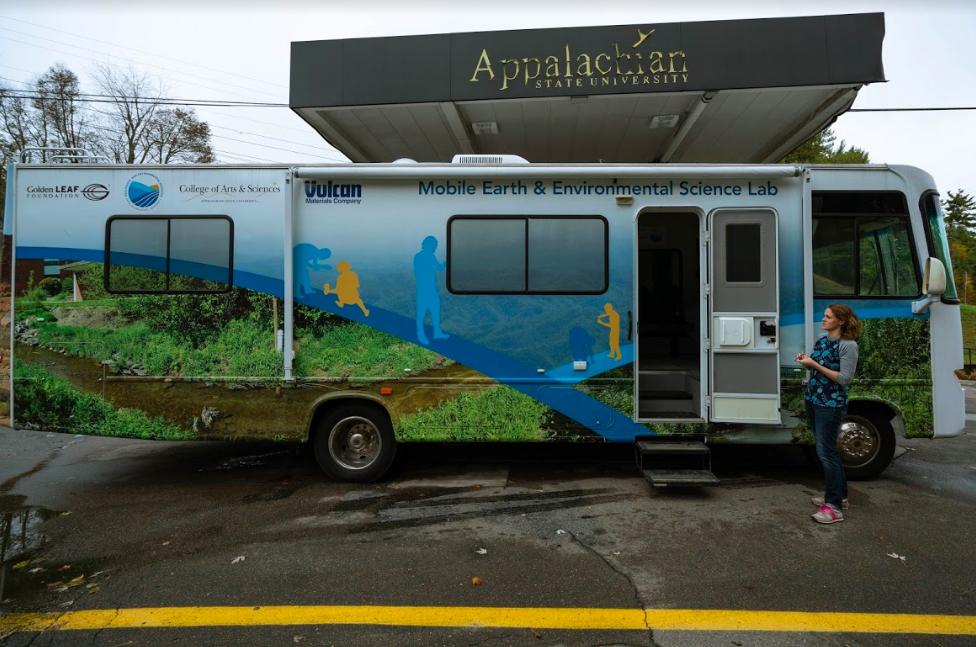The Department of Geological and Environmental Sciences salvaged a forgotten recreational vehicle and gave it new life—as a laboratory on wheels for elementary school children.
Dubbed the Geobago, the finalized vehicle premiered at the App State homecoming parade. Since then, the Geobago has visited with students at Cove Creek School and 200 geoscience professionals at the Carolina Geological Society’s 79th annual meeting.
On Nov. 3, the vehicle traveled to the North Carolina Fossil Club’s annual fossil fair in Raleigh, North Carolina, for its first large event outside of Watauga County.
Marta Toran, the K-12 Outreach Coordinator for the Department of Geological and Environmental Sciences, discovered the vehicle in the State Farm parking lot last spring. She said it had sat dormant for nearly a decade.
The Department of Chemistry and Fermentation Sciences previously attempted to transform it into a lab for chemical analysis on vineyards, but the project never came to fruition.
Toran saw potential for the RV to solve issues of educational accessibility.
“We have a lot of school groups that come to campus, but there are some that are limited,” Toran said. “They don’t have the money to bring their class to campus, or they have a class that is too big.”
Toran reached out to Andrew Heckert, director of the McKinney Geology Teaching Museum and professor of paleontology, and proposed that the department purchase the unit to improve its outreach. Work began on the Geobago with additional support from the College of Arts and Sciences, Vulcan Materials Company and College Access Partnerships.
The Environmental Protection Agency selected the Geobago project for a 2018 Environmental Education Grant. On Oct. 1, the EPA granted App State $62,001 to actively use the converted RV. The grant program provides financial backing for projects that “design, demonstrate or disseminate environmental education practices, methods or techniques,” according to an EPA news release.
Toran said Complete RV of Denver, North Carolina, renovated the water-damaged RV, removing the majority of the internal structure. She described it as a “flexible” space. There is open seating, a countertop area for microscopes and displays, outlets for computers, and plenty of space for energetic students.
Heckert said the Geobago can hold four people while in transport. He and Toran, along with undergraduate students, plan to travel to elementary schools to pique students’ interest in the earth sciences through hands-on activities and lessons.
“It’s amazing to me how few elementary school children have ever looked down a microscope at anything,” Heckert said. “We’ve got kids looking at these things that their teachers may not always have expertise in.”
Vulcan Materials Company, the crushed stone producer that operates a quarry off of N.C. Highway 105, became involved with the project to boost awareness of the importance of natural resources. The company has had a close relationship with the Department of Geological and Environmental Sciences for many years.
“We love getting involved with education of all ages. If you can get students excited about this industry, then we hopefully will be able to attract a workforce later on,” Denise Hallett, manager of government and community relations, said.
Vulcan Materials Company worked with Toran this summer to create a workshop for fourth grade teachers, providing them with lesson plans, hands-on activities and training on earth and environmental sciences.
The department intends to continue its outreach at schools and museums, educating the community on regional science and water issues.
“With this being mobile now, this just doesn’t have to stay in Boone. We can take Boone to the world,” Hallett said.
Story by Hayley Canal, News Reporter


